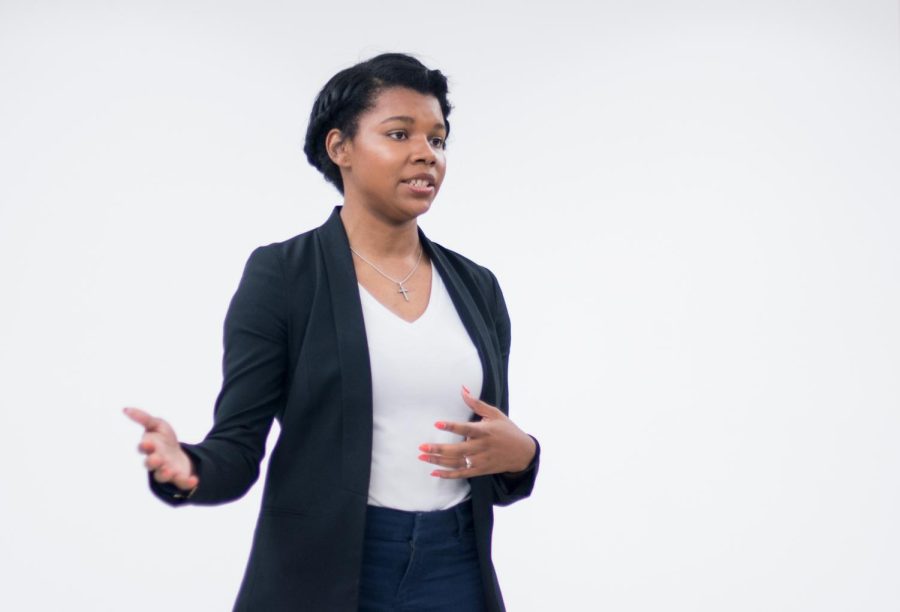Black United Students announces new president, other changes
Chynna Baldwin, the newly sworn in president of Black United Students, speaks to organization members during an emergency BUS meeting in Oscar Ritchie Hall Wednesday, Oct. 25, 2017.
October 27, 2017
Changes in leadership, lack of anticipated funding and miscommunication put Black United Students in a tight bind this semester.
The organization held an emergency mass meeting on Wednesday night to discuss future plans and ways to move forward despite the setbacks they’ve encountered.
Chynna Baldwin swearing in as the new president of BUS signified one of the immediate changes.
“The timing of this was kind of ironic, because I’m essentially picking up where I left off,” she said at the meeting.
Baldwin previously served as president of BUS in April 2016 but resigned in November 2016.
Iniah Dunbar, former president of BUS, stepped down from the position this week after being asked by administrators and co-vice presidents, as well as for her own “internal and external” reasons.
“I’m going to miss people coming to me and being a resource for them,” Dunbar said.
At the meeting, the organization also addressed the miscommunication between them and administration over funding.
“We’re left in a place where we’re missing a large portion of funding that we had anticipated having,” Baldwin said.
The organization expected a total of $80,000 in funding this year: $30,000 from the Blue and Gold Pride Fund, which they use for their traditional events; and another $50,000 from the previously announced Social Cultural Programming Fund.
“It was a verbal commitment that BUS was going to receive $50,000 of the $100,000 that was being allocated by President Warren…” Baldwin said.
The organization originally asked for Warren to allocate $100,000 to black student programming specifically, but Warren and administrators told them for legal reasons they couldn’t. They were, however, promised to receive half of the fund to serve as an example to other student organizations on how to use it, according to Baldwin.
For nearly two years, BUS tried to grab the university’s attention by having demonstrations and protests. They caught Warren’s eyes at their #KnowYourPrivilege demonstration in October 2015. After finally hearing them out, Warren sent Baldwin an email stating she earmarked $100,000 to the Social Cultural Programming Fund.
“The reason why the money is so pivotal is because there’s things we want to do for black students that aren’t happening on campus, and we cannot do that unless we have the funds,” Baldwin said.
Administrators putting a $5,000 cap on all organizations, including BUS, came as a surprise.
After Baldwin resigned from being president last year, no follow-up on the verbal commitment happened, resulting in a lot of confusion about the $5,000 cap being placed on BUS, as well.
“I think it’s really unfortunate because a lot of legwork was done (by BUS) to secure that money in the first place, “Baldwin said. “The ball got dropped on both our end and administrations.”
Students running the Center for Pan-African Culture and Student Diversity Action Council distribute the money to student organizations. They put the $5,000 cap on BUS without knowledge of the organization not receiving the $50,000 fund.
Taya Binford, the BUS director of political affairs and grievances and also a board member of Center for Pan-African Culture, agrees that BUS equally shares the blame.
“We failed on our part to keep administrative to their promise,” she said.
According to Shay Little, the vice president of student affairs, leadership transitions in BUS as well as new advisors coming in played a role in the miscommunication.
“There were a number of things happening and I think not everyone saw the written communications that we had in its entirety,” she said.
Patrick Ferguson, treasurer of BUS, acknowledged the organization’s failure to use up the funds administrators distributed to them in the past.
“They did go off our track record and the money we did not spend that was left over, so that was why they gave us such a small sum,” he said.
Although Dunbar became president last April, she did not know about administration’s verbal commitment of BUS receiving half of the fund until a month ago.
“If someone owes you money, they’re not going to tell you they owe you money,” she said.
As it currently stands, BUS only has the Blue and Gold Pride Fund to rely on. The Social Programming Fund will not be available to students until next semester. In the meantime, BUS will do everything they can to get back the funds they were originally promised, starting by reopening the conversation.
Ferguson wants the administrators to know that the organization will put all of the funds to good use, unlike previous years.
“We will be using this money for all these events to better our community and have a more enricher culture within Kent State,” he said.
Along with trying to get back those funds, BUS also wants to move forward and get back on track with being a resource for their community. Their goals for the rest of the semester include providing spaces for cultural, academic and leadership growth, and offering spaces for the use of that knowledge, according to Baldwin.
“…We’re getting ourselves together,” Binford said. “We have our goals, we have our vision and mission statement in mind, and we’re gonna succeed in that.”
Tierra Thomas is the African-American student life reporter. Contact her at [email protected].

















